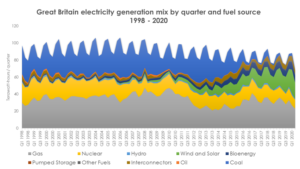GLEG Translates – Gas Invoice
January 13, 2021Oil is now trading at pre-pandemic levels
February 12, 2021Britain produced more electricity from renewable generators than from fossil fuels for the first time in 2020.
Combined wind, solar, bioenergy and hydropower – all renewable energy sources – generated a record 42% of the UK’s electricity in 2020 compared to fossil fuels, which accounted for 41% of the UK generation mix.
The below graph summarises how the UK’s electricity generation mix has changed since 1998. Over the last decade you can see how coal generation (blue) has been phased out and replaced by clean wind and solar energy (green).
Data Source: ofgem.gov.uk
In 2020 almost 25% of UK electricity generation was produced by windfarms, which is double the share of the generation mix than in 2015. Coal power generation, which is expected to be phased out this decade, only accounted for 2% of the UK generation mix in 2020. Gas remained the single largest source of power generation in 2020, accounting for 37% of the total mix.
Why?
UK electricity demand has fallen in recent years, mainly due to business energy profiles changing, businesses becoming more energy efficient and homes consuming less energy. 2020 saw covid-19 cause a reduction in UK electricity demand with shops, offices and restaurants closing which has helped renewables overtake fossil fuels as the main source of electricity generation.
Renewable energy, which is also the cheapest source of electricity, gained a larger share of the electricity mix as National Grid left gas plants idle and requested nuclear reactors to lower production to prevent the UK’s electricity network from being overwhelmed with more electricity than needed.
What Next?
The UK aims to reduce fossil fuel output over the coming years; with coal nearly gone it is likely the government will target gas fired generation. With renewable generation not able to guarantee supply all day every day, gas-fired power stations are an effective tool to bridge the gap between supply and demand when renewable output is low. It may prove trickier to phase out gas fired generation than it has been with coal.
For more information the UK energy mix and how the changes could impact your future business energy bills please contact hello@gleg.co.uk.
